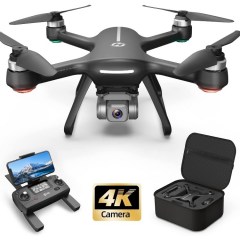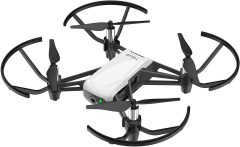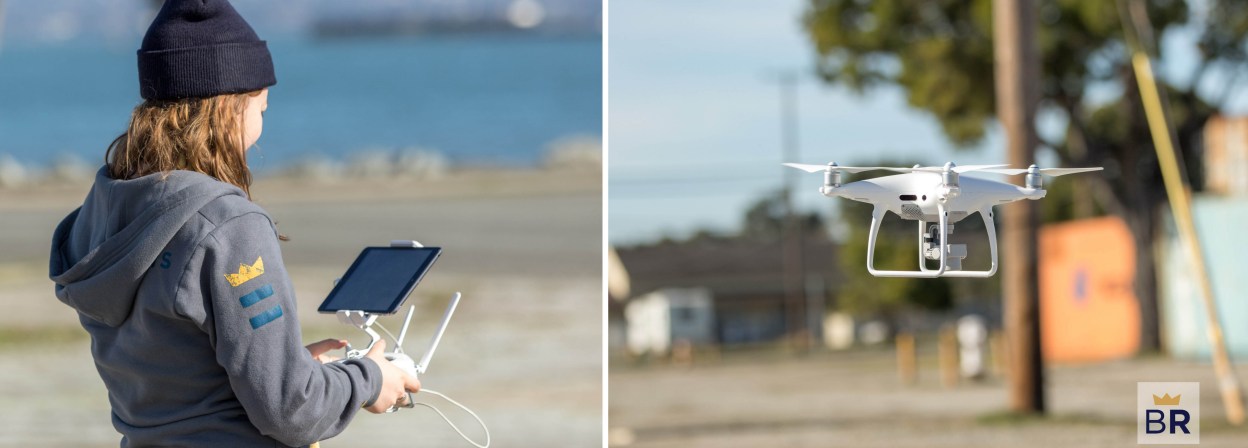BestReviews is reader-supported and may earn an affiliate commission. Details

The DJI Mini 3 Pro drone ranks at the top of our list for its high-quality flights and photography in our user testing.
The DJI Mini 3 Pro drone ranks at the top of our list for its high-quality flights and photography in our user testing.
Touchscreen controller is intuitive, making it an excellent choice for both beginners and experts. Arrives with plenty of drone storage that does not require a connection to a smartphone. Excellent photography with 4K-quality videos. Offers up to 34 minutes of flight time. Lightweight and relatively quiet.
Has the risk of overheating; not as pretty as other models on the market.

Fun and playful, this mini drone offers several interesting tricks while remaining safe to operate.
Fun and playful, this mini drone offers several interesting tricks while remaining safe to operate.
Offers 3 speed modes and 3D flips. Unique black-and-gold theme makes this model stand out in the sky. Prevents overheating thanks to the modular batteries. Propeller guards prevent damage from collisions or high winds. Lightweight and compact, making this a travel-friendly pick.
Does not offer the option to take pictures.

The Holy Stone mini drone is a durable quadcopter that serves as excellent entertainment for picnics or family gatherings.
The Holy Stone mini drone is a durable quadcopter that serves as excellent entertainment for picnics or family gatherings.
Features the ability to circle around, flip in midair, and rotate with ease. Users can change the level of speed depending on personal proficiency. Low-battery alarm alerts the player when it's time to recharge. Altitude keeps the drone at the same height, reducing the need for constant monitoring.
Some difficulties with operating the controller.

Designed with an anti-shake camera and long-lasting batteries, the Holy Stone drone is the ideal choice for high-quality photography.
Designed with an anti-shake camera and long-lasting batteries, the Holy Stone drone is the ideal choice for high-quality photography.
Built-in stabilization technology allows for clear and crisp videos. Batteries last up to 23 minutes, so users can capture several pictures in one round. User-friendly features include headless mode, air pressure sensor, and optical flow modules. Set the Follow-Me mode to guide the 'copter without a controller.
Battery life can drain quicker if operated at higher speeds.

Good beginner-friendly option that is controlled via smartphone and can be programmed.
Good beginner-friendly option that is controlled via smartphone and can be programmed.
Tello is easy to fly, making it a good beginner option. Operated using a smartphone and is programmable using the Scratch app. Has automated flight modes for easier use and to focus on pictures and videos.
Has a limited range.

We recommend these products based on an intensive research process that's designed to cut through the noise and find the top products in this space. Guided by experts, we spend hours looking into the factors that matter, to bring you these selections.

Quadcopters have soared in popularity in recent years and are now just as well-loved as toys as they are as professional tools.
If you're a consumer in the market for a quadcopter, where do you start? From basic models kids can pick up with their allowance to professional models that would set you back thousands of dollars, you'll find a huge range of quadcopters to choose from.

Let's start with the basics. What is a quadcopter?
A quadcopter is a type of drone (unmanned aircraft) that flies using four rotors, one in each corner of the craft. It's operated by a remote controller – also known as a transmitter – and may have a mounted camera for taking photos and videos. You can find basic quadcopters that are suitable for kids and beginner hobbyists as well as high-end quadcopters with a range of commercial applications.

As with any relatively technical hobby, you'll come across plenty of insider lingo and jargon when discussing and reading about quadcopters. We're here to demystify some of the acronyms and technical terms you might read while researching quadcopters.
RTF: RTF stands for "ready to fly.” An RTF quadcopter is fully assembled and ready to go right out of the box.
ARTF: ARTF stands for "almost ready to fly" and is sometimes shortened to ARF. An ARTF quadcopter requires a small amount of work or assembly before you can fly it.
BNF: BNF stands for "bind 'n' fly.” A quadcopter that comes without a transmitter (remote controller) and must be "bound" to one before use is a BNF.
RTH: RTH stands for "return to home.” This is a function some higher-end quadcopters have that forces them to return to their starting point or the pilot's location.
FPV: FPV stands for "first-person view.” A quadcopter with FPV has a live video feed that comes straight from the camera to an app, a screen on your controller, or a set of FPV goggles.
Follow Me: This feature forces a quadcopter to track a subject by honing in on a beacon, mobile device, or remote control.
Headless Mode: Useful for beginner pilots, this mode makes a quadcopter move in the direction the receiver's stick is moved, regardless of the direction in which it's actually pointed.

These are small, basic quadcopters on which beginners can cut their teeth.
Pros: These quadcopters are inexpensive and tend to be fairly easy to fly. They’re durable enough to take some hits, and replacement parts are cheap and readily available.
Cons: Beginner quadcopters don't fly as well as high-end quadcopters. The flight time is shorter, and the range is smaller.
Price: You could pay as little as $20 to $30 for a basic quadcopter. You could pay up to $200 for a more sophisticated “beginner” quadcopter.
Mid-range quadcopters are excellent for serious enthusiasts and hobbyists who don't have the budget for professional-grade models.
Pros: Many mid-range quadcopters have excellent cameras and a better flight time and range than beginner quadcopters. Though pricier than beginner quadcopters, they are more affordable than professional-grade quadcopters.
Cons: Quadcopters in this range may be more difficult to fly than beginner models. The best mid-range quadcopters are fairly pricey.
Although described as “professional,” these quadcopters can still be used by hobbyists – as long as they have a sizable budget.
Pros: Professional quadcopters have excellent cameras that shoot pro-grade footage, a long range and flight time, and plenty of useful extra features.
Cons: Quadcopters in this range can be tricky for inexperienced pilots to fly. They are also very expensive.
Price: Expect to spend a minimum of $800 and a maximum in excess of $5,000 on a professional quadcopter.
Racing quadcopters are fast, lightweight drones with FPV cameras. They are designed for taking part in drone races.
Pros: Racing quadcopters are extremely fast, maneuverable, and fun to fly for the thrill-seeker.
Cons: Racing quadcopters are hard to control and have a short flight time.

The flight time is the amount of time a quadcopter can fly for before it runs out of battery power. Unfortunately, even the best quadcopters have fairly short flight times, so don't imagine you'll be able to fly your drone all day without pause.
Basic models may have a flight time of just five to 10 minutes, whereas high-end models can fly for 25 to 35 minutes before they need a recharge.
The range is the distance from the controller that a quadcopter can fly. Basic models only have a range of 150 to 300 feet, whereas high-end models may have a range large enough to be measured in miles.
Most quadcopter pilots like to have a camera on their aircraft to record video and take photos from up high, and all but the most basic drones have cameras on them.
FPV cameras can stream footage to you in real time for an immersive experience, whereas other cameras save photos and footage to an SD card. But as we know, not all cameras are created equally. A cheap drone is unlikely to give you sharp, vivid images, though you can find quadcopters with cameras that shoot in 4K for under $100. The most impressive footage is still going to come from high-end quadcopters, since their cameras are of professional quality with excellent lenses and stabilization features.
The controller, or transmitter, is what you use to control your quadcopter from the ground. Most controllers have two analog sticks that control the direction and speed – a bit like you'd find on a games console controller. Some have a built-in LCD screen to display diagnostics or real-time footage, whereas others allow you to mount your smartphone on them so you can view this information via an app.

Buy a drone that matches your skill level. Some quadcopters are easier to fly than others. If you're a beginner, choose a model that's easy to fly, or start out with an inexpensive quadcopter so a crash-landing won't matter so much.
Consider a quadcopter with a brushless motor. Quadcopters with brushless motors are more expensive than those with brushed motors, but they last longer, are quieter, and are more efficient.
Keep spare batteries on hand. If you have spare batteries handy, you can switch them out when one runs out of juice. That way, you’re not necessarily limited to less than 30 minutes of flight time per session. Notably, spare batteries can be quite costly, especially for high-end quadcopters.

Q. Do I have to register my quadcopter?
A. Until recently, any quadcopter user in the U.S. had to register their drone with the FAA. At the time of this writing, however, this law no longer applies. Hobbyists don't need to register their quadcopters, although anyone using a drone for commercial use still needs to register it.
Q. Are there any places where you're not allowed to fly a quadcopter?
A. Unfortunately, you can't just fly your drone wherever you please. In the U.S., you're not allowed to fly your drone in any national park. Some states allow drones in state parks but others don't, so check local laws before proceeding. You'll also find strict rules about flying quadcopters in certain parts of Washington, D.C. and within five miles of airports.
If you're unsure where you can fly your quadcopter in your local area, consider contacting or joining your local chapter of the Academy of Model Aeronautics (AMA).
Q. Are quadcopters difficult to fly?
A. Quadcopters aren't necessarily difficult to fly, but don't expect to be an expert drone pilot the minute you get your new copter out of the box. There's a definite learning curve, and you're likely to have a few failed attempts before you get the hang of it. Make sure you fly your drone somewhere safe the first few times – it’s wise to choose a location where there are few people and obstacles.
Get emails you’ll love.
Learn about the products you’re wondering if you should buy and get advice on using your latest purchases.
